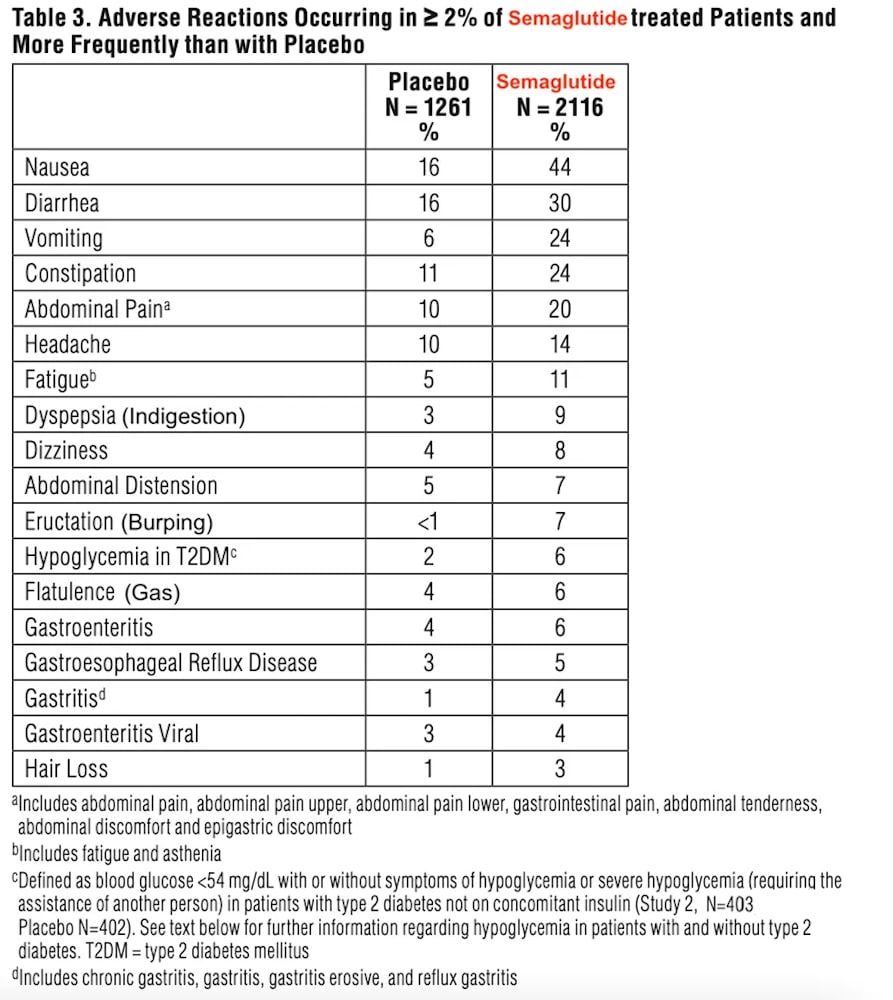“Giving up smoking is the easiest thing in the world… I know because I’ve done it thousands of times.” Mark Twain
Most of us feel the same way about weight loss!
It’s time for something NEW!
Something simple and safe!
Something that works!
Semaglutide!
What is Semaglutide?
- Semaglutide is a weight loss medication received by weekly injection
- Semaglutide is FDA approved for weight loss
- Semaglutide is more effective than all prior weight loss medications!

How Does Semaglutide Work?
- Slows down stomach emptying so that after eating, you feel full longer
- Suppresses appetite and food cravings (on average patients eat ~30% less)
- Lowers blood glucose levels (without making glucose levels too low)
Your body naturally produces several substances that affect your appetite. One of these is called glucagon-like peptide-1 (GLP-1). The body produces GLP-1 naturally when you eat. GLP-1 stops you from feeling hungry and makes you feel full or satisfied.
Semaglutide imitates GLP-1 in the body. This means that Semaglutide provides the same effect as this natural substance (GLP-1) in our bodies.
Reduced food intake: Because Semaglutide reduces feelings of hunger, you eat less food. When combined with a healthy diet and exercise, Semaglutide will help you lose weight.
Effect on plaques in your blood vessels: In animal studies, Semaglutide stopped the progression of plaque formation in blood vessels. This is likely why Semaglutide has also been shown to reduce the risk of cardiovascular events and strokes.

Semaglutide Treats Obesity AND Decreases the Health Risks Caused by Obesity
Losing weight with Semaglutide may enable you to stop taking your antihypertensive medications, your lipid/cholesterol lowering drugs, and medications for glucose control.
It’s time to treat the root cause of all these problems: Obesity

Most anyone that has more than 10-15 pounds of unwanted weight to lose.
If using insurance to pay for Semaglutide, one must have a BMI greater than 30 27 kg/m2, or a BMI greater than 27 kg/m2 (overweight) in the presence of at least one weight-related comorbid condition (e.g., hypertension, type 2 diabetes mellitus, or dyslipidemia).
Who Cannot Take Semaglutide?
You CANNOT take Semaglutide if you have any of the following conditions:
- personal or family history of Medullary Thyroid Carcinoma (MTC)
- personal or family history of Multiple Endocrine Neoplasia, type 2 (MEN 2)
- prior allergic reaction to Semaglutide or to any of its ingredients* (serious allergic reactions, including anaphylaxis and angioedema, have been reported with Semaglutide)
- diabetic retinopathy (diabetic eye disease)
- pregnant or trying to get pregnant (the estimated background risk of major birth defects is ~3% and the estimated background risk of miscarriage is ~18% – these percentages are increased with use of Semaglutide during pregnancy)
- breast-feeding (Semaglutide is present in breast milk)
- less than 18 years old
- depression with a history of suicidal thoughts
What Are the Ingredients in Semaglutide?
Active Ingredient: Semaglutide and L-Carnitine
Inactive Ingredients: disodium phosphate dihydrate, sodium chloride, and water for injection
You might not be able to take Semaglutide if you have any of the following conditions:
- history of pancreatitis (persistent severe abdominal pain, sometimes radiating to the back with or without vomiting)
- kidney disease/kidney insufficiency
- stomach problems (Semaglutide will likely make these problems worse)
- diabetes (must obtain approval for use from endocrinologist or primary care physician)
Where Can I Get Semaglutide?
- Shea Aesthetic Clinic now offers weekly Semaglutide injections to patients in the Knoxville and Oak Ridge areas.
What Do I Have to Do to Lose Weight While Taking Semaglutide?
- Walk (or other exercise) for 20-30 minutes a day
The Skinny on Semaglutide
On average, patients treated with Semaglutide for 68 weeks had the following results:
- Decreased body weight (on average, patients lose 26-34 lb. over 68 weeks)
- 70% of patients achieve at least 10% weight loss
- Over 50% achieve at least 15% weight loss
- One-third achieve at least 20% weight loss
- 3 ½ inch reduction in waist circumference
- 4.5 decrease in body-mass index
- 5 mmHg decrease in systolic BP
- Improved physical functioning
- Improved lipid profiles: decreased total cholesterol, VLDL, free fatty acids, and triglycerides
- Lowered fasting blood glucose level (Semaglutide improves blood glucose control in adults with type 2 diabetes and may be used with diabetes medicines)
- Lowered C-reactive protein (a marker of inflammation)
- Semaglutide reduces the risk of heart attack and stroke
We understand that losing weight and keeping it off is extremely difficult. We know you’ve tried sincerely to be successful at controlling your weight.
It can be so very discouraging and frustrating when attempts at dieting and exercise just don’t work.
It’s time to do something different… It’s time to try something that does work!
Shea Aesthetic Clinic is here to help you finally be successful.
If you are frustrated with the inability to lose weight, please call, and set up an appointment to discuss whether this medication is right for you: (856) 294-4114
Shea Aesthetic Clinic is the Highest Rated Medical Spa in the Knoxville and Oak Ridge areas.
You have given us this rating because we are compassionate, competent, and kind. Please let us help you on your weight loss journey.
Come Join the Community of the Fit and the Free, so That You Can Live the Life You Love!

Would You Like to Learn More About Semaglutide?
Listen to this excellent podcast about Semaglutide done by the Journal of the American Medical Association (JAMA) with behavioral psychologist, Tom Wadden, PhD (43 minutes)
How Will Semaglutide be Administered?
Semaglutide will be injected under the skin of your upper leg (thigh), stomach area, or upper arm.
It is given once a week (every 7 days). It will not be given more frequently than every 7 days.
It can be given on a full or empty stomach.
Semaglutide can be given with insulin. It just needs to be injected separately from insulin. The injections should not be given right next to each other. Make sure that injection sites are rotated.
What If I Miss a Scheduled Dose?
If you miss a dose, come in to receive the missed dose as soon as you can, ideally within 2 days of your scheduled visit.
You can receive your missed dose up to 5 days after your appointment. Then, your next dose will be given at your next regularly scheduled weekly appointment.
If it has been longer than 5 days after a missed dose, you will skip the missed dose and receive the next dose at your next regularly scheduled weekly appointment.
You will not be given double or extra doses.
If you have questions about a missed dose, please contact your healthcare provider at Shea Aesthetic Clinic.
What should I watch for while taking this medicine?
- It is very important for you to drink plenty of fluids while taking Semaglutide so that you remain well hydrated.
- You should drink enough fluid so that your urine is clear to light yellow in color.
- Drink at least half a gallon of water daily.
- Avoid sugary drinks and alcohol as these are major contributors to obesity.
- The loss of too much fluid can increase your risk of kidney injury while taking this medicine.
- If you have so much nausea, vomiting, and diarrhea that you feel dizzy, lightheaded, weak, tired, and/or have dark yellow urine, you must call Shea Aesthetic Clinic so that we can arrange for you to have a blood test to assess your kidney function.
- Learn the symptoms of low blood sugar and what to do if you notice these symptoms. Always carry a quick source of sugar with you in case you have symptoms of low blood sugar. Examples include hard sugar candy or glucose tablets.
- Do not become pregnant while taking this medicine. Men and women should stop Semaglutide at least 2 months before trying to get pregnant.
Adverse Effects of Semaglutide:
Up to 75% of patients have gastrointestinal side effects. These effects are generally mild-to-moderate in severity and are typically temporary.
95% of patients can continue using the medication despite these problems.
The most common gastrointestinal side-effects are nausea, vomiting, diarrhea, and constipation.
Patients may also experience abdominal pain, headache, fatigue, indigestion, dizziness, abdominal distension, bloating, burping, flatulence (gas), and gastroesophageal reflux (heartburn).

The average duration of these symptoms:
- Nausea, 5 days
- Diarrhea, 3 days
- Vomiting, 2 days
- Constipation, 27 days
Semaglutide is administered by injection once a week. It stays in your system for 7-14 days after each injection. It reaches its maximum concentration in the body 1 to 3 days after a dose. If you experience side effects, they will likely be most pronounced during the 1-3 days after each dose.
Side effects you should report to your doctor or health care professional as soon as possible:
- allergic reactions like skin rash, itching or hives, swelling of the face, lips, or tongue
- breathing problems
- changes in vision
- diarrhea that continues or is severe
- severe nausea
- frequent vomiting
- neck lump or swelling
- trouble swallowing
- signs and symptoms of infection like fever or chills; cough; sore throat
- signs and symptoms of low blood sugar (see below)
- signs and symptoms of kidney injury like trouble passing urine or change in the amount of urine
Drug Interactions
Semaglutide slows stomach emptying and has the potential to impact the absorption of oral medications. Make sure you tell your primary care physician that you are taking Semaglutide.
Things to Consideration Prior to Weight Loss Treatment with Semaglutide:
- Females and Males of Reproductive Potential: Semaglutide can increase the risk of birth defects and miscarriage. Semaglutide must be discontinued at least 2 months before a planned pregnancy.
- Risk of Thyroid C-Cell Tumors: Contact your primary care physician if you develop symptoms of thyroid tumors (e.g., a mass in the neck, difficulty swallowing, difficulty breathing, persistent hoarseness). This has occurred in lab animals given Semaglutide.
- Pancreatitis: Acute and chronic pancreatitis have been reported in clinical studies. Notify your primary care physician if you have signs and symptoms of pancreatitis (persistent severe abdominal pain, sometimes radiating to the back, with or without vomiting). If pancreatitis is suspected, discontinue Semaglutide promptly. If pancreatitis is confirmed, you will no longer be able to take the medication. This occurs in less than 1% of patients taking Semaglutide.
- Diabetic retinopathy: Rapid improvement in glucose control has been associated with a temporary worsening of diabetic retinopathy (vision problems).
- Hypoglycemia: Patients receiving Semaglutide in combination with insulin or a medication that increases insulin production (e.g., sulfonylurea) may have increased risk of hypoglycemia (low blood sugar), including severe hypoglycemia. Reducing the dose of insulin or other diabetes medications may be necessary while taking Semaglutide. You will need to tell the doctor that manages your diabetes that you are taking Semaglutide.
If you have symptoms of hypoglycemia, do the following: Eat or drink 15 to 20 grams of fast-acting carbohydrates.
These are sugary foods that are easily converted to sugar in the body:
- glucose tablets or gel
- fruit juice
- regular (not diet) soft drinks
- honey
- sugary candy
If you have the signs and symptoms of hypoglycemia, call your primary care physician or endocrinologist to discuss changing your medications.
Acute Kidney Injury: There have been reports of acute kidney injury leading to kidney failure, which may sometimes require hemodialysis, in patients treated with GLP-1 receptor agonists like Semaglutide. Some of these events have been reported in patients without known underlying kidney disease. This occurs in less than 1% of patients taking Semaglutide.
Most of these events occur in patients who experienced nausea, vomiting, or diarrhea leading to dehydration. So, if you have significant nausea, vomiting, diarrhea and feel dizzy, lightheaded, weak, tired, and/or have dark yellow urine, you must call Shea Aesthetic Clinic so that we can arrange for you to have a blood test to assess your kidney function.
**It is very important for you to drink plenty of fluids while taking Semaglutide so that you remain well hydrated. You should drink enough fluid so that your urine is clear to light yellow in color. Drink at least half a gallon of water daily. Avoid sugary drinks and alcohol as these are major contributors to obesity.
Acute Gallbladder Disease: Gallbladder disease is increased in patients that lose weight rapidly. If you have signs and symptoms of cholelithiasis (gall stones) or cholecystitis (inflammation of the gallbladder and its ducts) contact your primary care physician. You’ll need gallbladder studies and clinical follow-up. This occurs in about 1% of patients taking Semaglutide.
Signs and symptoms of gallbladder disease:
- pain in your upper stomach (abdomen)
- yellowing of skin or eyes (jaundice)
- fever
- clay-colored (pale/white) stools
Suicidal Behavior and Ideation: If you have depression and/or history of suicidal thoughts you should not take Semaglutide. If you experience suicidal thoughts or behaviors, you will need to stop taking Semaglutide immediately. Pay attention to any mental changes, especially sudden changes in your mood, behaviors, thoughts, or feelings. Call your healthcare provider at Shea Aesthetic Clinic and/or your primary care physician right away if you have any mental changes that are new, worse, or worry you.
Heart Rate Increase: Patients experience an average heart rate increase of 1-4 beats per minute (bpm) while taking Semaglutide. Some patients have a heart rate increase of up to 15-20 bpm. Tell your healthcare provider at Shea Aesthetic Clinic if you feel your heart racing or pounding in your chest, especially if it lasts for several minutes.
Injection Site Reactions: Less than 1% of patients taking Semaglutide experience injection site reactions (including injection site itching, irritation, inflammation, redness, and nodule formation).
Serious allergic Reactions: Call 911 or go to an Emergency Department if you experience signs of a serious allergic reaction
- swelling of your face, lips, tongue, or throat
- severe rash or itching
- very rapid heartbeat
- problems breathing or swallowing
- fainting or feeling dizzy
Please call Shea Aesthetic Clinic with any questions or concerns you have about Semaglutide. If Shea Aesthetic Clinic is closed, please call your primary care physician with any questions or concerns.


